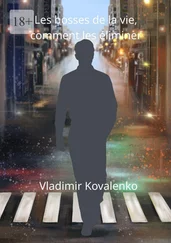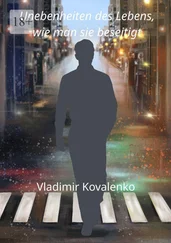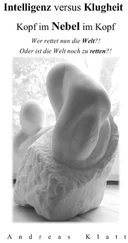*
Alone? Mother? Father?
†
We clean room, make beds. People sleep.
‡
Up, little girl.
§
Your girl poop.
The Voices Had Almost Dwindled
THE VOICES HAD ALMOST DWINDLED away in the kitchen at the foot of the staircase, when some other, agitated voices mixed in with them, becoming progressively louder and angrier … Had something happened to mother, too? She appeared at the top of the steps in her white coat, gloves and hat, with only her face red. The washerwoman with the sheets, the black-clad woman, the tall gentleman and Vati all followed behind her, but stopped at the top of the steps and watched her. “Was habt ihr mit den Kindern angestellt? In den Gang gefeuert mit allen Koffern? Das ist eine pure Tollheit und Unverschämtheit,” *she shouted, pointing to us and waving her other hand at them … So were Gisela and I going to have to move from this place in the hallway now, too? Once mother calmed down and approached us she wasn’t just red, she was drenched in tears. The white and black women smiled contentedly. “Sag doch was!” †she said to father. Taking his usual short, refined steps, Vati approached the gentleman, and the tall gentleman approached him. Vati said something in his language which was like the semi-audible sounds a person might make while eating and drinking. Both women approached and listened, practically cheek to cheek, when the black-clad gentleman spoke. The hallway became almost drafty with tension … and I could hardly wait for us to get out of there. Vati went over to mother, who kept taking her coat off and putting it back on, and he explained something to her, making small gestures with his hands. “Und wenn! Und wenn es auch zwölfe ist, noch kein Mensch hat das Zimmer gemietet,” ‡she exclaimed. The white and black women stood there looking, while the gentleman with the bony face and narrow forehead had already left. At last we went down the stairs, too, with the suitcases and Gisela, who walked by herself with her feet turned out like a clown’s. We left the suitcases behind the desk with the keys and in exchange got a tin disk with a number.
It was warm outside when we finally went out the door, there were people everywhere, and it was noisy. Horses, trams, bicyclists, the palms outside the front door, the lace curtains over the windows, people with backpacks, women carrying wide baskets on their heads, two boys my age walking past the display windows shirtless and barefoot, which surprised me. Gisela walked on her own, dressed in her little coat and with her cube-shaped hat pushed back off her head and dangling from her shoulders. Vati walked ahead of us, blazing a trail and showing the way. Slowly we reached the corner of the big hotel and turned into the street of tall buildings with wide ledges at the windows — this was the street down which we’d seen the glass castle the night before. Despite all the noise it was muffled, tepid and thick like a warm compress over our ears. The street was full of people whom I would see just that instant, of course, and then never again, because they would disperse all over the world. A big gray building with a fence right in front of its facade resembled a building in Basel … Much farther down the street there was a brownish building with statues on top. That one was truly impressive. It was just a shame the statues didn’t include any children or flags … The sidewalk was wide. Alongside it there were thin, yellowish brown carts on two tall wheels. Big white bundles of sheets lay on them … maybe the very same ones from the hotel … and milk canisters with handles. At the end of the street part of the green hill was visible and the brown end of the castle. I ran to join father. “Vati, werden wir auf das Schloß gehen?” §“Ja, nach dem Mittagessen.” ‖“Es wird keine Zeit mehr übrig bleiben,” asaid mother, who joined us with Gisela sitting on her shoulders. “Wir müssen mit dem ersten Zug fahren.” bI made a bad face. Then, walking in the broad shade on the right side of the street, we came to the display window of a butcher’s shop where something tiny was moving. Behind the big cuts of meat and loaves of cheese garnished with parsley, there was a procession of tiny, white, spotted cows that kept disappearing into a little white house, out of which on the other side came stubby, fat, bean-colored sausages, which then turned a corner behind some cheese and bacon before disappearing from view. This was like that goose at the Macreus shop at home, that lifted its wings in the display case full of white down, and then each time it flapped, more feathers came fluttering down from the ceiling like snow. But this display was more interesting. I exchanged glances with Gisela, who also wanted to look. She was craning her neck over mother’s shoulder and pushing the brim of her hat down, so that mother finally had to stand still and turn her back slightly toward the display window. The little cows kept trundling down their semi-circular path toward the little white house, coming out of it as stubby, fat sausages. Mother took just one look at the cattle being converted into ground meat, and then was ready to move on. “Nein, nein, ich schaue noch.” cBut mother went on to the corner as fast as Gisela would allow, even though she was pounding her little fists on her shoulder. I stayed standing in front of the display window. The little cows, all identical, with bells on their collars, all came at the same speed, disappearing through the little open door one after the other. They called me to come. Gisela, who still wanted to look, was pounding on mother’s back. I dawdled so I could figure out where exactly the little cows were coming from, but I couldn’t make anything out. All I could see were their horned heads appearing from under a mountain of cheese, more or less out of nowhere, and advancing like a column of soldiers before going under some ham into the little white house. It was the same deal with the browned sausages. They vanished toward the back into an abyss much like the one the little white cows with their tiny black hooves emerged from. It was impossible to discover or figure out how the processing took place, much less any trick behind it. Vati came back to get me, he looked at the transformation, then he took me by the arm and dragged me away from the display pane. Mother was waiting at the corner. Oh, how pleasant it was to walk on the asphalt that was soft as dough in that warm city. At home on the Luisenplatz or in the rue de la Couronne it was always as hard as rock. “Folge ein wenig. Wir müssen eine Menge Sachen erledigen,” dmother said. As we crossed the street, people looked at her and at Gisela, but also at Vati and me, as if through wooden masks. Big copper disks had been embedded in the roadway for the pedestrian crossing and both rows of shiny buttons reminded me of Basel. There, at the intersection of rue Helder and the Bahnhofstraße there were disks just like these, and it startled me a bit to find them here, too, so far away from home by train, and at the same time I was happy, because I knew what they were for. Now I already had two things that were like home. On the other side of the street we walked past a tall building into a rather dirty little side street. It had display windows with black ledges and black doors, like coffin lids, and in front of them there were crates with bones and ashes, but there was a gold barber’s plate, which I also recognized, jutting out from the wall. Eventually we made our way to a short, one-story wooden building, painted violet blue, with small windows and tiny little shutters and with a dark blue printed sign hanging from it with white letters spelling F O T O … Aha, this I could understand! On account of the short buildings all around in this neighborhood the sky had become even more bottomless, almost threatening, hot and glowing from the blurred sharpness of the fog-shrouded sun, and this made the building seem even older and darker from close up. The pictures in the display windows showed men with oatmeal-colored skin and fair-skinned women, girls with wreaths on their heads, soldiers wearing stiff, coarse uniforms and monstrously huge caps like kettles, with long, thin, curved sabers hanging next to the seams of their trousers … the hand guards on the sabers were almost hidden under tassels, pompons and ribbons … The better, more elegant, best-groomed ones had wide, gleaming tablets on their shoulders, high-peaked caps with big coats of arms that featured a half moon with stars, stripes on their trousers and boots. They sat with their sabers between their legs or next to them. They looked a little wild, and that was fine, but also a bit odd and bereft, as though they were slightly deranged. In one picture I discovered something I could relate to: a boy in a sailor’s shirt and cap sitting on a wicker chair like one we had at home … Heaps of sand and masonry stones lay in the street. Mother flushed red with anger and shame when she had to step up by crossing a board. Dark-skinned men stood in the ditches, working with picks and shovels, but without jackhammers or other equipment. They were naked down to the waist and watched as she walked over the plank. They had dark eyes, hooked noses, regular features like in the movies, prominent jaws and heads that came to a point at the crown. With their white caps and kerchiefs on their heads they looked like regular heathens or pirates. The faces lined up in the ditch, one after the other, all looking at us. They were smiling. I had never before seen such beautiful, white, powerful fangs, as though they had nothing but cream in their mouths. When we got to the end of the ditch, mother set Gisela down and began to whine. “Das ist das Gasthaus,” eVati said, pointing down a narrow street that was literally baking in the sun. As we crossed the narrow street, my sandals sank up to the ankles in thick, hot dust mixed with bits of stone. An old lamp hung over the entrance to a modest building. On the wall next to it there was a painting of a white-haired gentleman in a dazzling, embroidered, gold-braided jacket. In his right hand he was raising a glass and looking through it. “Ist dieser Anzug aus Gold?” fI asked Vati … “Ja, es scheint so,” ghe answered.
Читать дальше












